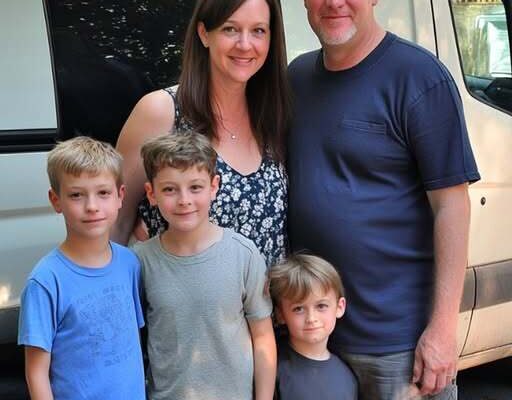We had been saving money for a new car for three years — three years of stretching every dollar, skipping vacations, and putting off small luxuries.
With three kids under ten and a van on its last legs, a dependable vehicle wasn’t just nice to have, it was really needed. David had always seemed committed to the goal, or so I believed.
One evening, as I tucked the kids into bed, David walked in, his expression a mix of excitement and unease. “I did something today,” he said.
“Oh?” I replied, already feeling uneasy.
“I booked a trip to Paris for Mom!” he announced, beaming like he had just done something incredible. I still went.
“You did what?”
“She’s always wanted to go. She’s done so much for us, I thought she deserved something special.”
“And where, exactly, did the money for this come from?”
He glanced away. “I…uh…used the car savings.”
My stomach dropped. Three years of sacrifice, for this? “You took the money we needed for a safe car for our children and spent it on a vacation for your mother?”
“IT’S MY MONEY TOO!” he snapped, being defensive. “SHE DESERVES IT! GRATITUDE DOESN’T HAVE A PRICE TAG!”
I didn’t argue. My silence wasn’t acceptance, it was the quiet before the storm.
Over the next few days, I played the role of the supportive wife while carefully crafting my next move.
David’s mother, Barbara, was thrilled about the trip. She started posting in our family group chat about how she’d stroll along the Seine, see the Eiffel Tower at night, and indulge in fresh croissants every morning. She had absolutely no idea how that trip was being funded, and part of me didn’t want to blame her. Barbara had always been kind to me and the kids, often helping with babysitting when we were in a pinch. She had no clue David had emptied the “new car” account for her dream trip.
Meanwhile, I was stuck juggling phone calls from the local mechanic. Our van had started making a new grinding noise. We had put so many miles on it that the slightest engine sputter made my heart race. We couldn’t be left without a car for the kids, but we also couldn’t exactly afford another round of pricey repairs.
One evening after the kids were asleep, I sat David down at the kitchen table. I set the bills in front of him—repair estimates, grocery receipts, and a breakdown of our monthly expenses. “Here’s what I want you to see,” I began calmly. “We can’t afford to both pay for your mom’s trip and replace the van. And you know we need a working vehicle.”
He tried to brush me off, insisting he would figure something out, maybe work extra shifts at his job. But I had seen David’s track record with finances. He was generous to a fault, always wanting to spoil the people he loved, but never quite looking at the long-term impact. That night, I handed him an ultimatum: I wasn’t going to stay quiet and pretend everything was fine. He needed to make this right.
David’s eyes darkened. “It’s too late to cancel,” he muttered. “Mom’s trip is non-refundable. I’m sorry, but I can’t just tell her she can’t go.”
I took a deep breath and nodded. “Fine. But that doesn’t mean you’re off the hook. You made a promise to our family, too.”
The twist came when Barbara herself showed up on our doorstep three days later. She had noticed the tension in David’s voice whenever he called, and being a sharp woman, she started asking questions. It didn’t take long for her to piece things together.
“You used the car fund for me?” she demanded, staring David down in our living room. “That’s the money you two have been setting aside for years—why on earth would you do that?”
David looked like a deer in headlights. “I just wanted to do something nice for you, Mom. You’ve always talked about Paris. I wanted to make your dream come true.”
Barbara closed her eyes, exhaling slowly. “And what about your family’s dream? A new car? David, how could you think I’d be comfortable going on a fancy trip while you all are stranded with a broken-down van?”
“I just—” he started, then stopped. The guilt washed over his face. He realized he had only been thinking about the immediate rush of generosity and not the toll on our family finances.
To my astonishment, Barbara put her foot down. “Cancel it,” she said. “I’ll pay the cancellation fees if we must. If it’s truly non-refundable, then I’ll talk to the airline and see what can be done. But I can’t, in good conscience, go gallivanting around Paris while you’re left in this predicament.”
David tried to argue that he wanted her to enjoy it, that maybe we’d figure out another way, but Barbara was adamant. “You both have three children who need a safe ride to school and sports practice. I’ve lived my life—if Paris is meant to be, I can save for it myself.”
That night, David and I talked more openly than we had in years. He admitted he felt stuck between wanting to show appreciation for his mother and being the husband and father he needed to be. In his mind, those two responsibilities were battling each other, and he made a rash choice. It didn’t excuse his actions, but it gave me a glimpse into what led him there.
In turn, I apologized for shutting him down so quickly and not communicating the toll this financial stress was taking on me. I realized that quietly brewing anger wasn’t the same as solving the problem together.
Barbara spent the next few weeks negotiating with the travel company. Although some of the booking deposit was lost, she managed to secure partial refunds. And David, true to his word, started picking up extra work on weekends to replenish our depleted car fund. I chipped in too by taking on a few part-time shifts at a local bakery while the kids were in school. It wasn’t easy, but with both of us pulling in the same direction, that savings account started growing again.
A few months later, we finally managed to upgrade to a modest but reliable family SUV. Barbara, feeling more than a little guilty about the whole ordeal, contributed a small amount to help us reach our goal. That gesture, along with our combined efforts, reminded all of us that when families communicate openly and support one another, even tough obstacles become manageable.
Life doesn’t always go as planned, but we learned a crucial lesson about balancing generosity with practicality. David’s heart was in the right place, but so was our need for financial stability. Talking it out—really talking, not just reacting—let us come together instead of letting resentment tear us apart.
In the end, we got our dependable car, Barbara got peace of mind, and we all learned that true love considers both short-term joy and long-term well-being. Don’t let one slip-up define a relationship. Instead, use it to grow stronger and smarter together.
If this story resonated with you in any way, please share it with your friends and like this post. You never know who might need to hear this reminder today.



